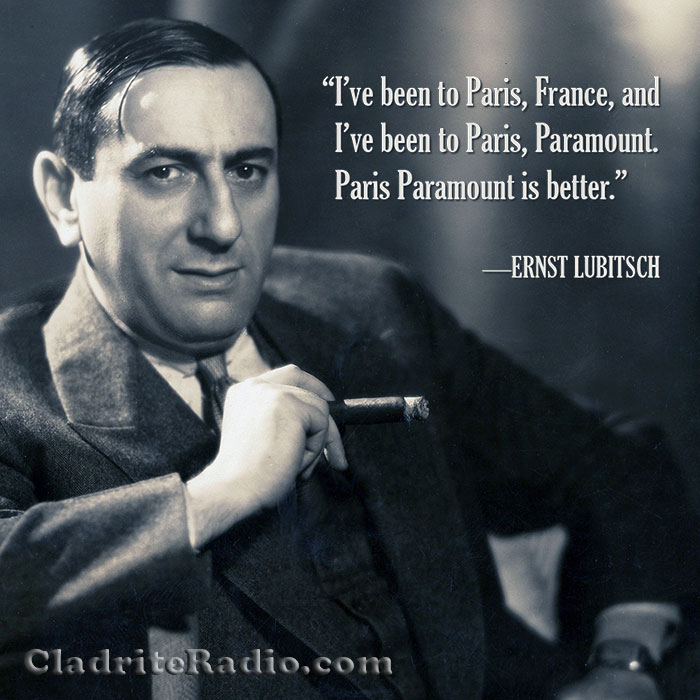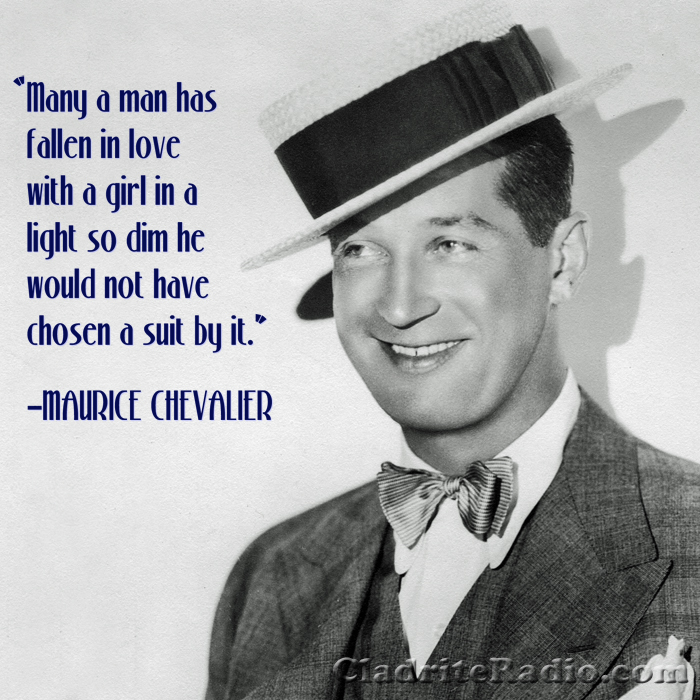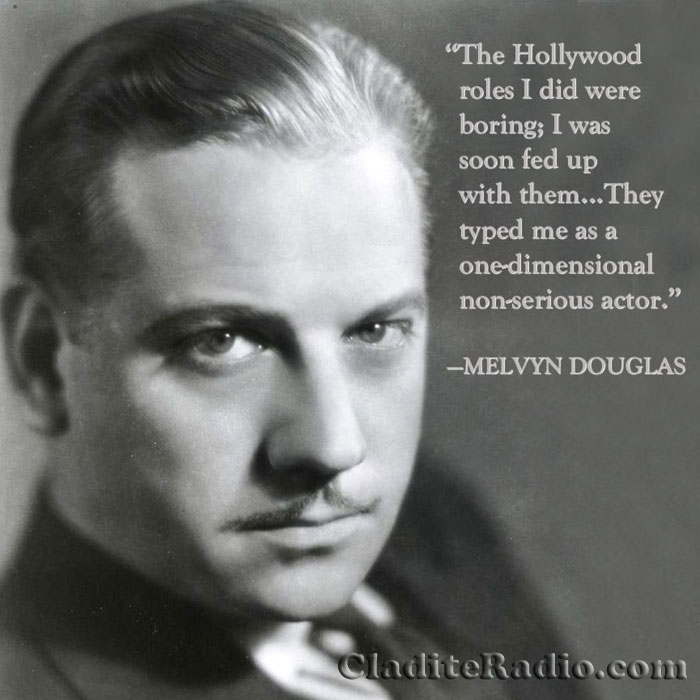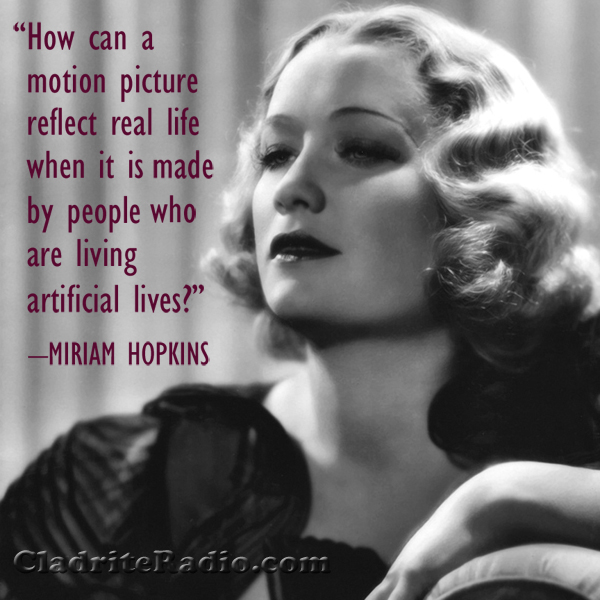Here are 10 things you should know about Gene Tierney, born 98 years ago today. She was surely one of the most beautiful actresses to ever grace the silver screen.
Tag: Ernst Lubitsch
Happy 125th birthday, Ernst Lubitsch!
The great—and we do mean great—Ernst Lubitsch was born 125 years ago today in Berlin, Germany. He would go on to direct some of the greatest comedies in cinema history. Here are 10 EL Did-You-Knows:
Lubitsch’s parents were Ashkenazi Jews; his father was a tailor who hoped that his son would follow in his footsteps, but Ernst was interested in the theatre.
Lubitsch began his career as an actor, making his film debut in 1913 in The Ideal Wife. He directed his first picture in 1914. He would go on to act in approximately thirty films before making the switch to directing fulltime in 1920.
In 1922, Lubitsch was hired as a director by Mary Pickford and came to Hollywood. He and Pickford didn’t get along while they made their first and only picture, Rosita, together, but he was quickly offered a six-picture deal by Warner Brothers that gave him his choice of cast and crew and final edit privileges.
Lubitsch’s reputation for creating sophisticated comedies began in the silent era, but it was with the rise of talking pictures that he really found his stride. Many of his early sound pictures—The Love Parade (1929), Monte Carlo (1930) and The Smiling Lieutenant (1931) among them—were musicals that certainly featured elements of the stylish comedic work he would come to be associated with, but it was with his 1932 masterpiece, Trouble in Paradise (1932), that he made his first big splash in the genre of romantic comedy. He would make no more dramas after Broken Lullaby (1932).
After several years with Paramount Pictures, Lubitsch was named the studio’s production manager, making him the first director to run a major studio.
In 1939, Lubitsch moved to MGM, where he directed Ninotchka. Though he was longtime friends with the picture’s star, Greta Garbo, Ninotchka was the first and last time the pair would work together.
Billy Wilder cited Lubitsch as his favorite director. He is said to have had a sign over the door in his office that read, “How Would Lubitsch Do It?”
The Lubitsch classic The Shop Around the Corner (1940) was remade twice: In 1949 as a musical (In the Good Old Summertime, starring Van Johnson and Judy Garland) and in 1988 as a romantic comedy (You’ve Got Mail, starring Tom Hanks and Meg Ryan). The 1963 Broadway musical She Loves Me was also based on the film’s source material, the play Parfumerie by Hungarian playwright Miklós László.
Lubitsch’s unique blend of wit and sophistication came to be known in Hollywood and around the world as “the Lubitsch Touch,” a label which critic Michael Wilmington ably described: “At once elegant and ribald, sophisticated and earthy, urbane and bemused, frivolous yet profound. [Lubitsch’s pictures] were directed by a man who was amused by sex rather than frightened of it—and who taught a whole culture to be amused by it as well.” We couldn’t agree more.
In 1946, Ernst Lubitsch received an honorary Academy Award for his distinguished contributions to the art of the motion picture. He died of a heart attack the next year.
Happy birthday, Ernst Lubitsch, wherever you may be!

Happy 128th Birthday, Maurice Chevalier!
Actor, singer and rake Maurice Chevalier was born 128 years ago today in Paris, France. Here are 10 MC Did-You-Knows:
- Chevalier began his show biz career at age 13, singing in a local cafe.
- At 27, Chevalier was involved briefly with an performer named Fréhel, among France’s biggest stars of the day. She helped him get his first major role, in a show in Marseille called l’Alcazar, for which his critical notices were very positive.
- Chevalier once served as sparring partner to former light heavyweight champion of the world, boxer Georges Carpentier.
- Chevalier spent two years as a prisoner of war in Germany during World War I.
- Chevalier moved to London in 1917 and found success there at the Palace Theatre; he went on to make his Broadway debut in 1922 in the operetta Dédé.
- When talkies arrived, Chevalier headed for Hollywood, debuting in Innocents of Paris in 1929.
- By 1930, Chevalier had earned the only two Oscar nominations of her career, both in the Best Actor in a Leading Role category, for The Love Parade (1930), directed by Ernst Lubitsch, and The Big Pond (1930).
- In 1959, Chevalier was awarded a special Oscar for his half-century of contributions to the world of entertainment.
- Chevalier is said to have been very tight-fisted. When he was on contract with Paramount Pictures, he balked at the ten cents a day he was expected to pay for parking in the studio lot; he was able to negotiate a rate of a nickel a day instead.
- Chevalier’s accent in pictures was reportedly something of a put-on. He actually became quite fluent in English and spoke with only a slight accent. But he knew which side his croissant was buttered on.
Happy birthday, Maurice Chevalier, wherever you may be!

Happy 115th Birthday, Melvyn Douglas!
Melvyn Douglas, born Melvyn Edouard Hesselberg 115 years ago today in Macon, Georgia, was the product of an unlikely marital pairing: His father was a Latvian Jewish immigrant, a concert pianist who taught music in university conservatories, and his mother was from Tennessee (with English ancestry that extended back to the Mayflower). Douglas’s father never mentioned he was Jewish and his mother referred to him in her son’s presence as simply as “foreign.” So Douglas didn’t know of his Jewish heritage until he was 18 years old, when his aunt Cora clued him in.
Douglas dropped out of high school to pursue a career in theatre, and he found success on Broadway (in 1928, he played the same role, a gangster, in the drama A Free Soul that Clark Gable would play in the 1931 movie adaptation opposite Norma Shearer). In 1932, Douglas answered Hollywood’s call and though his ensuing screen career was a successful one, it would be some years before he found satisfaction in motion pictures.
“The Hollywood roles I did were boring,” said Douglas, perhaps best remembered today as the man who made Greta Garbo laugh in Ernst Lubitsch‘s classic comedy, Ninotchka. “I was soon fed up with them. It’s true they gave me a world-wide reputation I could trade on, but they also typed me as a one-dimensional, non-serious actor.”

In the early ’60s, his leading man days behind him (and the iron grip of the studio system loosened), Melvyn Douglas began to find work as a character actor, and it was only then that he had the free reign he sought in choosing roles. “I do a picture only because I want to do it, for my own reasons,” he said at the time. “If it’s a lemon, at least I picked it.”
Douglas achieved the rare triple threat for an actor: He won an Oscar (two, actually, for Best Supporting Actor, in Hud [1963] and Being There [1979], an Emmy (Best Actor-Drama for a 1967 CBS Playhouse production entitled Do Not Go Gentle into That Good Night) and a Tony (Best Actor-Play, The Best Man [1960]). Douglas died in 1981 at the age of 80.
Happy birthday, Mr. Douglas, wherever you may be! We quite liked your work in those pictures of the 1930s and ’40s, but we’re glad you got to expand your range a bit before you were through.
Happy Birthday, Miriam Hopkins!
Ask the average man or woman on the street about Miriam Hopkins, who was born 113 years ago today in Savannah, Georgia, and you’ll likely receive a blank stare. But movie buffs well recall her many standout performances.
Hopkins had what TCM.com has described as “an intriguing, husky voice and a brittle, sometimes twitchy yet sexy style.” And like Bette Davis, with whom she was reputed to have had a long-running feud, she was as much a character off the screen as on it.
Hopkins frequently returned to the stage, where her career had begun, when things slowed down for her in Hollywood, and in 1933, she originated the lead role of Julie in Jezebel on Broadway. The play didn’t do particularly well, but when Warner Brothers sought the rights to the play, of which Hopkins was part-owner, for a film adaptation, Hopkins demanded she be cast as Julie before she would agree to the deal. After receiving assurances that she would, in fact, portray Julie in the film, Hopkins signed off the deal, only to see Davis be given the role instead. And worse, Davis went on to win an Oscar, her second, for her work in the film. That didn’t set well with Hopkins.
In 1938, Hopkins and Davis were paired in a film, The Old Maid (1939, based on an Edith Wharton story), and on the first day of shooting, Hopkins got Davis’s goat by showing up in a dress that was a duplicate of one Davis had worn in Jezebel.
Davis wrote of Hopkins’ work in The Old Maid, “Miriam used and, I must give her credit, knew every trick in the book. I became fascinated watching them appear one by one…When she was supposed to be listening to me, her eyes would wander off into some other world in which she was the sweetest of them all. Her restless little spirit was impatiently awaiting her next line, her golden curls quivering with expectancy.”
Among the memorable pictures that stand out in Hopkins’ career are some true classics: The Smiling Lieutenant (1931), Design for Living (1933) and Trouble in Paradise (1932) for director Ernst Lubitsch, Rouben Mamoulian’s Dr. Jekyll and Mr. Hyde (1931), and a picture that is considered among the most memorable of pre-codes, The Story of Temple Drake. She also starred in Becky Sharp (1935), the first three-strip Technicolor feature.
Happy birthday, Ms. Hopkins, wherever you may be!

